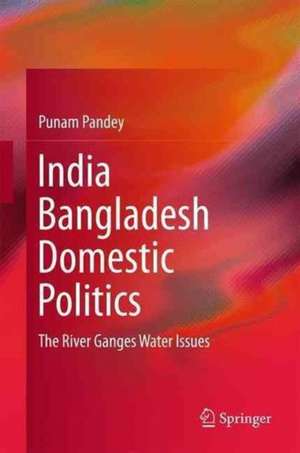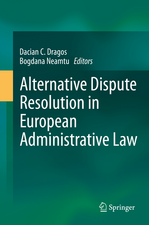India Bangladesh Domestic Politics: The River Ganges Water Issues
Autor Punam Pandeyen Limba Engleză Hardback – 15 dec 2016
| Toate formatele și edițiile | Preț | Express |
|---|---|---|
| Paperback (1) | 547.53 lei 38-44 zile | |
| Springer Nature Singapore – 5 iul 2018 | 547.53 lei 38-44 zile | |
| Hardback (1) | 643.34 lei 3-5 săpt. | |
| Springer Nature Singapore – 15 dec 2016 | 643.34 lei 3-5 săpt. |
Preț: 643.34 lei
Preț vechi: 756.86 lei
-15% Nou
Puncte Express: 965
Preț estimativ în valută:
123.10€ • 128.54$ • 101.65£
123.10€ • 128.54$ • 101.65£
Carte disponibilă
Livrare economică 25 martie-08 aprilie
Preluare comenzi: 021 569.72.76
Specificații
ISBN-13: 9789811023705
ISBN-10: 9811023700
Pagini: 215
Ilustrații: XVII, 138 p. 1 illus. in color.
Dimensiuni: 155 x 235 x 15 mm
Greutate: 0.5 kg
Ediția:1st ed. 2016
Editura: Springer Nature Singapore
Colecția Springer
Locul publicării:Singapore, Singapore
ISBN-10: 9811023700
Pagini: 215
Ilustrații: XVII, 138 p. 1 illus. in color.
Dimensiuni: 155 x 235 x 15 mm
Greutate: 0.5 kg
Ediția:1st ed. 2016
Editura: Springer Nature Singapore
Colecția Springer
Locul publicării:Singapore, Singapore
Cuprins
Chapter 1.- Cooperation to Confrontation to Cooperation over the Ganges between India and Bangladesh.- Chapter 2. Evolution of the Ganges Issue in India and Bangladesh.- Chapter 3. Negotiating Strategy on the Ganges: Bilateralism vs. Multilateralism.- Chapter 4. Role of Multiple Tracks in The Ganges negotiations.- Chapter 5. Experience of The Ganges Treaty and Future Directions.- Chapter 6. Analytical Observations and Conclusion.
Notă biografică
Punam Pandey is currently Postdoctoral Research Fellow at the Institute for Reconciliation and Social Justice (IRSJ), University of the Free State, South Africa. Before that she worked as Assistant Professor at the Department of Political Science, University of Delhi, India, from where she also obtained her PhD. As a postdoc researcher at the IRSJ, she has written extensively on water politics from the perspective of International Relations. She broadly works on non-traditional security issues in South Asia with a special focus on India and Bangladesh. Some of her publications can be accessed in the refereed journals like Asian Survey, India Quarterly: A Journal of International Affairs, and South Asian Survey among others. Her current research project at the IRSJ is on the issues of memory contestation where she researches the Liberation movement in the competitive politics of Bangladesh.
Textul de pe ultima copertă
This book deals with how the governments of India and Bangladesh manage the Ganges River. On the basis of the Ganges issue, it explains India’s involvement in the domestic politics of Bangladesh and how this involvement, in turn, shapes Ganges river politics. The book further analyses the constant friction between Indian preferences for bilateral negotiation in comparison to Bangladesh’s demand for multilateral cooperation on the Ganges. This also highlights the role of civil society, tracing how organisations have engaged in and explored potential compromises acceptable to both countries. As the term of the treaty comes to an end in 2026, the present work underlines its limitations, as the impacts of climate change will involve far more than distress on water. In closing, it discusses a range of other challenges, including the erosion of the Indian central government’s monopoly in foreign policy, especially in relation to its neighbours. Through extensive fieldwork in India and Bangladesh, together with interviews with politicians, diplomats and all those closely associated with the Ganges deliberations, the book reveals subtle aspects of the negotiations. What emerges as a distinctive feature of Indo-Bangladesh interactions on the Ganges is the fact that successful outcomes depend on the extent to which the ruling political powers in both countries accommodate one other’s domestic political dynamics. This insight enriches scholarship on the Ganges River, addressing an aspect largely overlooked in the literature. Offering an up-to-the-minute analysis, the book examines the implementation of the Ganges Treaty through 2015, making it of interest to researchers focusing on South Asia and international relations, scholars on and practitioners of Indian foreign policy, journalists, water experts, civil society groups, and university students.
Caracteristici
Discusses the conceptualization and implementation of the Ganges Treaty over almost two decades Considers the difficulty of mediating between the emerging demands of climate change and changing dynamics of Indian federalism Explores qualities that make the Treaty resilient post 2026 Includes supplementary material: sn.pub/extras










